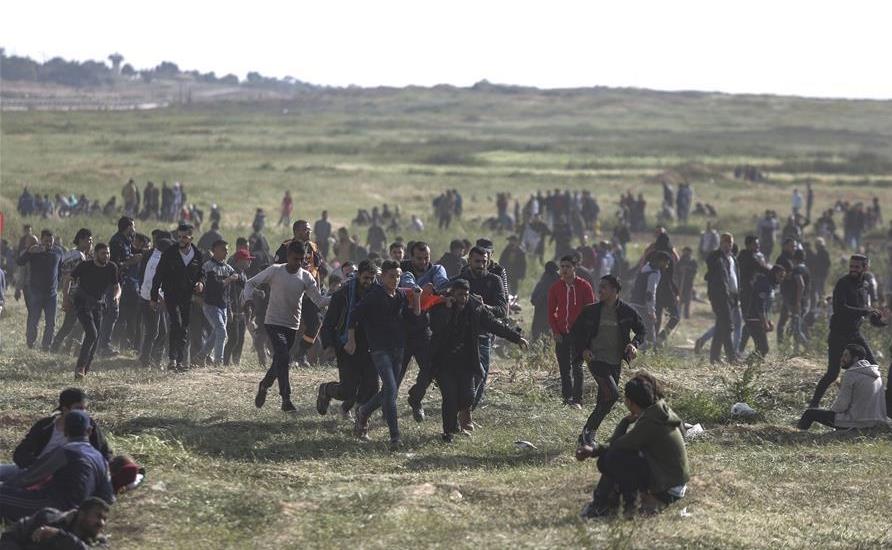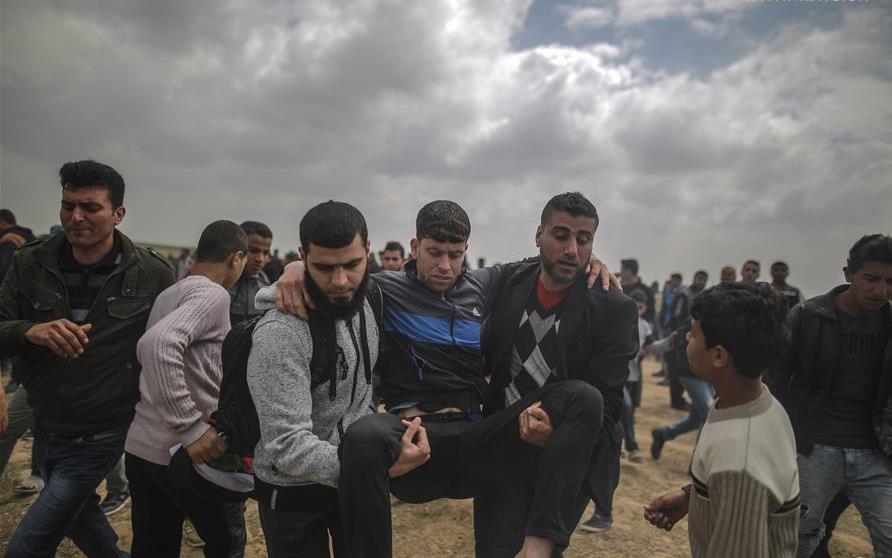Gaza's anti-Israel 'peaceful' rally turns violent, leaving 16 Palestinians dead

A wounded Palestinian is evacuated during a protest along the border fence between Gaza Strip and Israel in Gaza City, on March 30, 2018.
Although the anti-Israel Palestinian mass rally in Gaza was supposed to go peaceful, the demonstrations turned violent, leaving at least 16 Palestinians killed and over 1,400 others injured.
The rally, dubbed Great March of Return, is a month-and-half long sit-in staged along the border fence between the Gaza Strip and Israel to demand the return of Palestinians refugees who were forced to leave their cities during the Arab-Israeli war in 1948.
The sit-in started on Friday, which coincides with the Palestinian Land Day, an annual occasion marking the Palestinians' protest over Israeli confiscation of their lands.
The event will wrap up on May 15, the commemoration day of Israel's Independence Day and the Palestinian Day of "the Nakba," or the catastrophe, when thousands of Palestinians were expelled from their towns and cities that became later Israeli territories.
The rally is also meant to defy a tight Israeli blockade that has been imposed on the coastal enclave since 2007, when Hamas had violently seized control of Gaza after routing forces loyal to the Palestinian Authority.
Organizers said the rally was going to be peaceful as demonstrators would stay 700 meters away from the border with Israel. As groups of protesters got closer to the fence, it sparked clashes with Israeli troops stationed along the borders.
Since early Friday, thousands of Palestinians flocked to the rally, amid Israeli readiness to foil any border infiltration attempts.

A wounded Palestinian is evacuated during a protest along the border fence between Gaza Strip and Israel in Gaza City, ib March 30, 2018.
Witnesses said confrontations broke out when Israeli soldiers fired tear gas to disperse hundreds of Palestinian protesters.
They added that Israeli army deployed more forces, including armored vehicles, snipers, sniffing dogs and soldiers equipped with tear gas, rubber bullets and live ammunition to prevent Palestinians from reaching the fence.
The Israeli army declared a status of alert and deployed large forces along the borderline area.
"I will not leave the sit-in..I came here to stay until it is over," Abu Adham Darabeh told Xinhua as he waved the victory sign.
The old man, who comes from a village near Gaza, said the Israeli response to the peaceful rally will not make him leave.
The rally is considered Gaza's largest mass protest in the history of the Palestinian-Israeli conflict, as tens of thousands of Palestinians gathered in an unprecedented scene near the Gaza Israel borderline.
Entire families and people of ages joined the rally, which came from an idea made by academic and human rights figures and later adopted by the Palestinian factions.
Abu Hossam Obeid, 55, told Xinhua that he came with his wife and children to demand their right to return to the lands of his father and grandparents who had been forced to flee in 1948.
"We came here to deliver a message to the world and Israel that we are here and committed to our hope to return to our country and the homes of parents and grandparents soon," the man said as he sat near a tent.
So far, it is almost impossible to bring back Obeid and other Palestinian refugees to their lands, but the man expressed his joy to be at the nearest point to his original town of Majdal, north of Gaza.
Tents were set up in at least five main areas in eastern Gaza Strip, with toilets, meals and Internet services provided to encourage participants to join the sit-in.
"When our ancestors were forced out by Israelis, they turned into homeless people in tents, and we will return to our land from tents," said Um Omar, a 41-year-old woman from Gaza.
The Palestinian refugees' struggle to return home has been one of the key and thorniest issues in the final status negotiations between the Palestinians and the Israelis, as both cling to their own beliefs in this regard.
The Palestinians base their assertion of the right of return on the United Nations General Assembly resolution number 194 of 1948, which calls for allowing the return of Palestinian refugees to their homeland and payment of compensation for those not wishing to go back, a resolution that Israel still denies.















